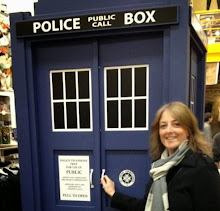Wednesday, April 4, 2007
Smile... you're on Candid Camera
 …and pick up that rubbish, mate!
…and pick up that rubbish, mate! From Reuters:
Britain will fit more surveillance cameras with loudspeakers allowing security staff to berate people spotted dropping litter, fighting or vandalizing property, the government said on Wednesday. Home Secretary John Reid hopes the talking cameras -- which have been on trial around the country -- will help cut crime. But critics say the idea is another lurch towards Britain becoming a ``surveillance society.'' …``Talking CCTV is another tool in creating safer communities,'' Reid said in a statement. ``It uses modern technology to allow camera operators to speak directly to people on the streets to stop or prevent them acting anti-socially.'' Louise Casey, a civil servant who co-ordinates the government's Respect campaign to tackle bad behavior, said people could ``face the shame of being publicly embarrassed.''
Britain is the most watched country in the world, with an estimated 4.2 million CCTV cameras, or one for every 14 people. As a result, surveillance has emerged as a thriving industry in Britain, where many residents seem eager to trade personal privacy for the perception that the cameras reduce crime and other anti-social behaviours. CCTV cameras are everywhere in Britain: the workplace, motorways, public squares and gathering areas, and many are choosing to install them inside their own homes. According to Privacy International:
CCTV is very quickly becoming an integral part of crime control policy, social control theory and 'Community consciousness'. It is promoted by police and politicians as primary solution for urban dysfunction.
But do these cameras really work, or do they just move the problems along to areas where there is no surveillance? Many dispute the statistics provided by law enforcement agencies and argue that the cameras are typically placed in “high-rent” districts and displace the criminal activities into more “low-rent” areas.
In addition to more public CCTV cameras, the Blair government is also planning to issue national identity cards with a corresponding database of personal information. No wonder even the UK's Information Commissioner has labeled Britain a “surveillance society”.
Subscribe to:
Post Comments (Atom)





4 comments:
I've visited London 4 times in the past 15 years and noticed the cameras were more prevalent with each visit. I guess the question we all need to ask is: how far is too far? Many like yourself, feel the privacy trade-off is worth the gain in public safety. I liked photo radar, when we used to have it, for a similar reason - everyone slowed down, the drive to work was much more relaxing and safer. Privacy is like a rubber band - it's very elastic, depending on the person and the circumstances. Thanks for dropping by LB.
The question isn't and shouldn't be about whether the individual "has anything to hide."
But at the same time technological developments have progressed to a point where surveillance is not going anywhere soon.
David Brin has suggested that perhaps one way to deal with this is to empower EVERYONE to use the cameras...and to put the cameras in more places than just the public streets. In police cars for example.
The question of whether you have "anything to hide" is itself a political one. It shouldn't be hard to imagine a circumstance in which Tories for example were more likely to be surveilled even though they've nothing to hide...except presumably their political party. The power to surveil citizens almost automatically puts some citizens on constant guard.
David Brin suggested that something like this is a natural consequence of technological development and that we can't turn back the clock. What we can do though, is open the cameras up...by allowing everyone to use them. And also by putting them in a number of different places--like in police cars for example.
Thanks for the comment, Lester. As you say, David Brin makes an excellent point in his book The Transparent Society, about ensuring that the public has the same access to surveillance technologies as those in power. I'm interested in reading his fiction book, Kiln People, on this topic.
I worry about how cameras in public places will affect people's willingness to protest publicly ... or to do anything publicly for that matter. Whether or not you're doing anything wrong may become irrelevant if "someone" watching decides that you are doing something wrong.
So far, Canada has not developed the proliferation of surveillance cameras that the UK has. When cameras have been installed, by the RCMP or by the private sector, there have been challenges to the Privacy Act.
Thanks again for your comments,
Sharon
Post a Comment